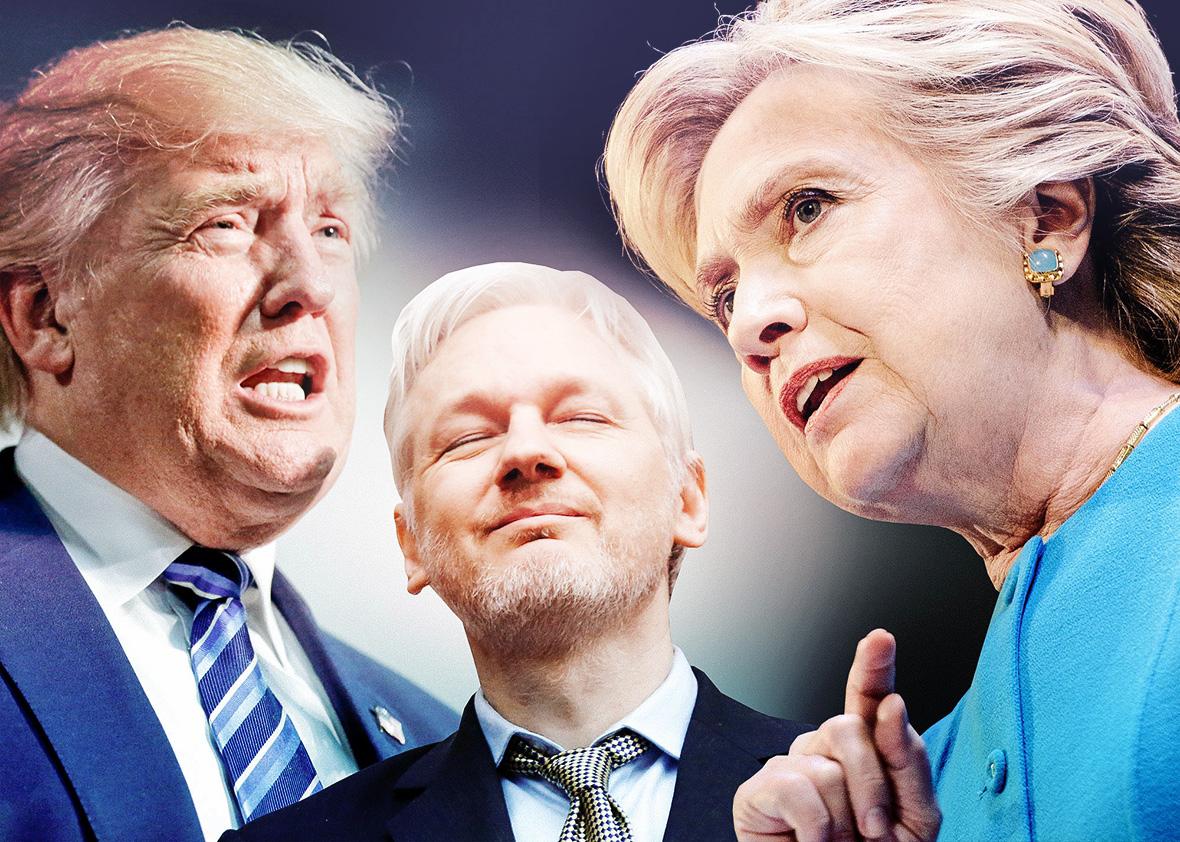What to make of WikiLeaks these days? Is it a conduit for whistleblowers and the promotion of global glasnost—or has it morphed, as even some of its onetime supporters lament, into a tool (or perhaps stooge) of the Kremlin?
Ecuadorean President Rafael Correa is clearly wondering. Four years ago, Correa granted asylum to WikiLeaks founder Julian Assange, who has since been holed up inside the country’s London embassy to avoid extradition. This week, though, Correa cut off Assange’s internet access, releasing a statement that Ecuador upholds “the principle of non-interference in the internal affairs of other countries” and, in particular, “does not interfere in external electoral processes” or “favor any particular candidates.”
With WikiLeaks’ latest batch of emails from Hillary Clinton’s campaign and Assange’s own warnings of an “October surprise” that could damage her chances of winning the presidency, the WikiLeaks founder has done just that, and from Ecuadorean territory.
Should American reporters and editors be growing leery too? Should they be printing the campaign emails? In a thoughtful essay in the Intercept, Glenn Greenwald, WikiLeaks’ most thorough defender, dismissed the question’s validity. “A source’s motives,” Greenwald wrote, “are irrelevant in deciding whether to publish.”
Generally speaking, he’s right. As anyone in the news business knows, leakers have various motives, many of them less than noble. Some act out of principled concern for the national interest or public safety, but others do it to sate their egos or to hurt political or bureaucratic rivals. Reporters and editors have to be cognizant of these motives, but mainly to assess whether the leaked information is true or complete. If it is, if it’s interesting and in the public interest, if its disclosure won’t do any harm (or if its value is seen as outweighing its harm), then, yes, they should publish. For instance, it was revealed, many years after the fact, that Mark Felt, the “Deep Throat” of the Watergate saga, gave secrets to the Washington Post’s Bob Woodward as part of a power struggle within the FBI. (Felt was the bureau’s deputy director at the time.) But that doesn’t diminish the Post’s stories as some of the greatest feats in American journalism.
But what if the source of a leak is a foreign power, and a somewhat adversarial foreign power at that? And what if the foreign power is leaking the information in order to sway the course of American democracy? Does that alter the principle or tilt the equation? This would be an extreme case, but WikiLeaks’ release of Clinton campaign emails is precisely such a case. In a widely publicized statement on Oct. 7, the director of national intelligence and the secretary of homeland security proclaimed that “the Russian government directed” the hacking of those emails—in fact, “based on the scope and sensitivity” of the hacks, “only Russia’s senior-most officials could have authorized these activities”—and that the hacks were “intended to interfere with the U.S. election process.”
If this assessment is true (and it was said to be the conclusion of the entire U.S. intelligence community), should American news outlets allow themselves to be used in this fashion? Let’s put the question more starkly. Imagine that the Russian ambassador approached a reporter or editor with the emails and said that he hoped their publication would affect our presidential election. That should at least ring some warning bells about motive. The fact that no leaks of any sort have come out about Donald Trump’s campaign might sound the bells a bit louder—especially since its computers are loaded with Windows Server 2003, making them very vulnerable to hacking. No doubt the Russians have hacked them, if just for intelligence-gathering purposes. Where are those emails? It may be that Russia has an interest in embarrassing Hillary Clinton and not embarrassing Donald Trump. In other words, the primary curator of this story may well be “Russia’s senior-most officials.” Quite aside from the question of whether the emails are damning or particularly interesting, is the source and the motive, in this case, relevant in a decision to publish?
I don’t know the answer. In the words of Jeffrey “The Dude” Lebowski, “It’s a very complicated case, a lot of ins and outs and what-have-yous.” But it is a valid question to consider.
Assange’s relation with the Russian government and its allies has been an unsettling issue for some time. In 2011, a WikiLeaks staffer named Israel Shamir was caught providing raw intelligence documents to the interior minister of Belarus, whose leader, Aleksandr Lukashenko, was a strong ally of Vladimir Putin’s. James Ball, another WikiLeaks staffer, quit the organization—and subsequently wrote about the scandal for the Guardian—when Assange forbade any internal criticism of Shamir, a close friend of his. It may also be worth noting that Assange hosted a short-lived show on Russia’s RT channel, a propaganda arm of Putin’s government.
Ecuador’s Correa reaffirmed Assange’s asylum status even while cutting off his access to the internet for a while (presumably until after Nov. 8). Maybe the American news media should adopt a similar stance toward WikiLeaks in general, treating its wares as interesting and even revelatory, especially when its stuff reveals wrongdoing, but cutting it off—and, in any case, judging warily—when the source of its goods and its motives cross a bold, red line.
